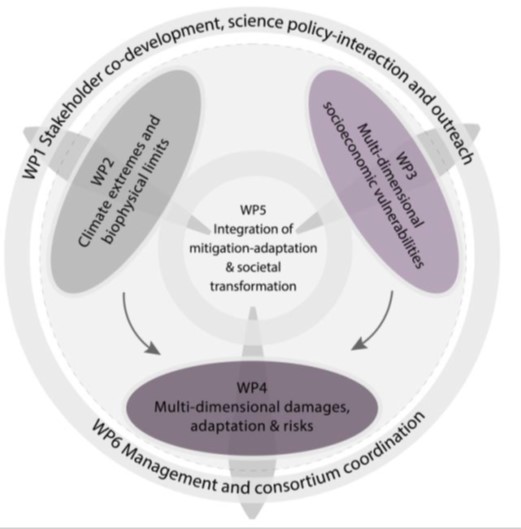
The SPARCCLE project will deliver adaptation and mitigation strategies for a just and climate resilient Europe, as well as support policymaking for action on the socioeconomic risks that climate change brings.
Addressing the risks of climate change within the next decade has become extremely urgent and is an essential part of longer term sustainable development. Climate change brings many highly uncertain impacts onto society and economy, and its risks, incorporating vulnerability, require more comprehensive assessments.
SPARCCLE will establish new methodological frameworks to link knowledge across disciplines from research communities working on climate impacts and risk in Europe. Bottom-up assessments of multidimensional climate vulnerabilities, risks, damages and adaptation will be combined with top-down integrated assessment frameworks (IAFs) and leading multi-sectoral macro-economic models.
This will deliver new, cutting-edge European capabilities to identify the characteristics of both sectoral and systems-level transformations required for climate-resilient and just development that reduces socioeconomic risks for Europe related to both sudden extreme events and slow onset processes.
The main goals of SPARCCLE are:
- Accelerate new probabilistic emulators of climate hazards, damages and risks, incorporating cross-sectoral interactions, spillovers, monetization of climate impacts.
- Develop granular socioeconomic projections, including gender and socioeconomic heterogeneities and multidimensional vulnerabilities informed by empirical assessment.
- Develop insights on mitigation-adaptation synergies and trade-offs, sectoral risks, and provide region-specific recommendations on short and long term climate policy responses, considering energy security and import dependence.
- Co-creation with public and private stakeholders through knowledge transfer, capacity building activities, and open science.
- Co-design stress-test scenarios that explore socioeconomic climate risks with stakeholders and policymakers, including sectoral stress tests.
Work Packages:
- WP1: Stakeholder co-development, science policy-interaction and outreach
- WP2: Climate extremes and biophysical limits
- WP3: Multi-dimensional socioeconomic vulnerabilities
- WP4: Multi-dimensional damages, adaptation and risks
- WP5: Integration of mitigation-adaption and societal transformation
- WP6: Management and consortium coordination
SPARRCLE brings together leading experts from across Europe
Partners:
- The International Institute for Applied Systems Analysis (IIASA, Austria)
- E3 Modeling (E3M, Greece)
- Euro-Mediterranean Center on Climate Change (CMCC, Italy)
- Institute of environmental protection (IOS-PIB, Poland)
- Climate Analytics (CA, Germany)
- Potsdam Institute for Climate Impacts Research (PIK, Germany)
- Vrije Universiteit Brussel (VUB, Belgium)
- Netherlands Environmental Assessment Agency (PBL, Netherlands)
- University of Florence (UNIFI, Italy)
Associate Partners:
- Swiss Federal Institute of Technology in Zürich (ETHZ, Switzerland)
- Imperial College London (ICL, United Kingdom)
- Joint Research Centre (JRC, European Commission)
At IIASA, SPARCCLE project involves four research programs: Energy, Climate and Environment (ECE), Biodiversity and Natural Resources (BNR), Advancing System Analysis (ASA) and Population and Just Societies (PopJus).
This project has received funding from the European Union’s Horizon Europe research and innovation program under grant agreement No 101081369 (SPARCCLE). This website is the sole responsibility of the SPARCCLE Project and does not represent the opinion of the European Community nor is the European community responsible for any use that might be made of the data appearing herein.
News

17 July 2023


